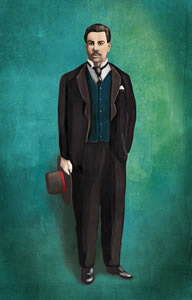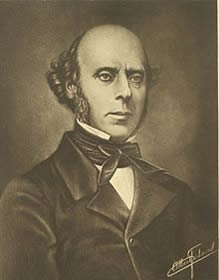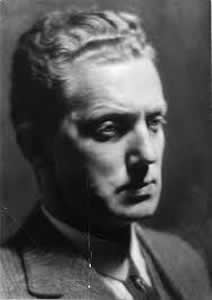De Mexicaanse dichter Ramon Lopez Velarde werd geboren op 15 juni 1888 in Jerez. Zie ook alle tags voor Ramon Lopez Velarde op dit blog.
Now, as Never…
Now, as never, you fill me with love and sorrow;
if any tear is left me, I quicken it
to wash our two obscurities.
Now, as never, I need your presiding peace;
yet already your throat is but a whiteness
of suffering, suffocating, coughing, coughing,
and our whole being but a screed of dying strokes
overflowing with dramatic farewells.
Now, as never, your essence is venerable
and frail your body’s vase, and you can give
me only the exquisite affliction of
a clock of agonies, ticking for us towards
the key minute when the feet we love
must tread the ice of the funereal boat.
From the bank I watch you embark; the silent
river sweeps you away, and you distil
within my soul the climate of those evenings
of wind and dust when only the church-bells chime.
My spirit is a cloth of souls, a cloth
of souls of an eternally needy church,
it is a cloth of souls bedabbled with wac,
trample and torn by the ignoble herd.
I am by a penurious parish nave,
a nave where endless obsequies are held,
because persistent rain prevents the coffin
from being bought out on the country roads.
The rain without me and within the hollow
clamour of a psalmist, louder and louder;
my conscience, by the water sprinkler aspersed,
is a cypress sorrowing in a convent garden.
Now my rain is flood, and I shall not see
the sunshine on my ark, because my hear
on the fortieth night must break for good;
my eyes preserve not even a faint gleam
of the solar fire that burned my corn;
my life is nothing but continuance
of exequies under baleful cataracts.
Vertaald door Samuel Beckett

Ramon Lopez Velarde (15 juni 1888 – 19 juni 1921)
Portret door Rastasaurio
De Canadese dichter en schrijver François-Xavier Garneau werd geboren op 15 juni 1808 in Ville de Québec. Zie ook alle tags voor François-Xavier Garneau op dit blog.
Au Canada (Fragment)
II
Ainsi chantait ma muse et sa lyre plaintive,
Comme le vent du soir, murmurait sur la rive;
Mais les échos muets étaient sourds à sa voix.
Et le peuple qu’autrefois
Enthousiasmaient ses chants, enivrait son histoire,
Peu soucieux de sa gloire,
S’endormait maintenant pour la première fois.
Hélas! dans son insouciance
Il passe comme un bruit qu’on oublie aussitôt:
Rien de lui ne dira son nom ni sa puissance;
Il s’éteindra comme un flot
Qui se brise sur le rivage,
Sans même à l’oeil du matelot
Laisser empreinte son image.
Où sont, ô Canada! tes histoires, tes chants?
Tes Delucs, tes Rousseaux, l’honneur de l’Helvétie,
Tous ces hommes enfin qu’illustrent les talents,
Qui font un peuple fier, grandissent la patrie,
Font respecter au loin son nom, ses lois, ses arts,
Et, pour sa liberté, lui servent de remparts?
L’étranger cherche, en vain, un nom cher à la science.
Notre langue se perd, et dans son indigence
L’esprit, ce don céleste, étincelle des Dieux,
S’éteint comme une lampe, ou comme dans les cieux
Une étoile filante au funeste présage.
Déjà, l’obscurité nous conduit au naufrage;
Et le flot étranger envahissant nos bords
De nos propres débris enrichit ses trésors.
Aveuglés sur le sort que le temps nous destine,
Nous voyons sans souci venir notre ruine.
Ô peuple subjugué par la fatalité,
Tu sommeilles devant l’oracle redouté.
Il rejette ton nom comme un arbre stérile,
Que l’on veut remplacer par un scion fertile.
Il dit: laissons tomber ce peuple sans flambeau,
Errant à l’aventure;
Son génie est éteint, et que la nuit obscure
Nous cache son tombeau.

François-Xavier Garneau (15 juni 1809 – 2 februari 1866)
De Noorse schrijver Trygve Emanuel Gulbranssen werd geboren in Oslo op 15 juni 1894. Zie ook alle tags voor Trygve Gulbranssen op dit blog.
Uit: The Wind From the Mountains (Vertaald door Naomi Walford)
“Unlike many priests of the time, Pastor Ramer did not mount the pulpit in order to philosophize and excuse for God being possibly–and unfortunately–in existence. He was there to hold a service and he so believed in God that the whole church lived.
Marvelously the sleigh-bells rang out and marvelously the torches flared across the snowy spaces and between the tress of the forest ridge, when they drove home. Mighty words, suited not only to good fortune and great days, but of value also in days of adversity and death, rang in their ears through the darkness with the song of the bells and flamed in the torchlights, all the way from church to Björndal’s tun.
Because of the many guests, they had eaten in the new building hitherto, but when they came home from church, the Christmas table was spread in the inner room of the old house, as in all other years, with abundance of meat and fish and other foods, as was the custom from olden times.
The guests felt something of what Adelaide had once felt at this table: reverence for the living spirit of former times and ancient power, and the genuineness and security pervading everything, from the wall-timbers and the beams in the roof to the handsomely carved chairs and the table-silver.”

Trygve Gulbranssen (15 juni 1894 – 10 oktober 1962)
